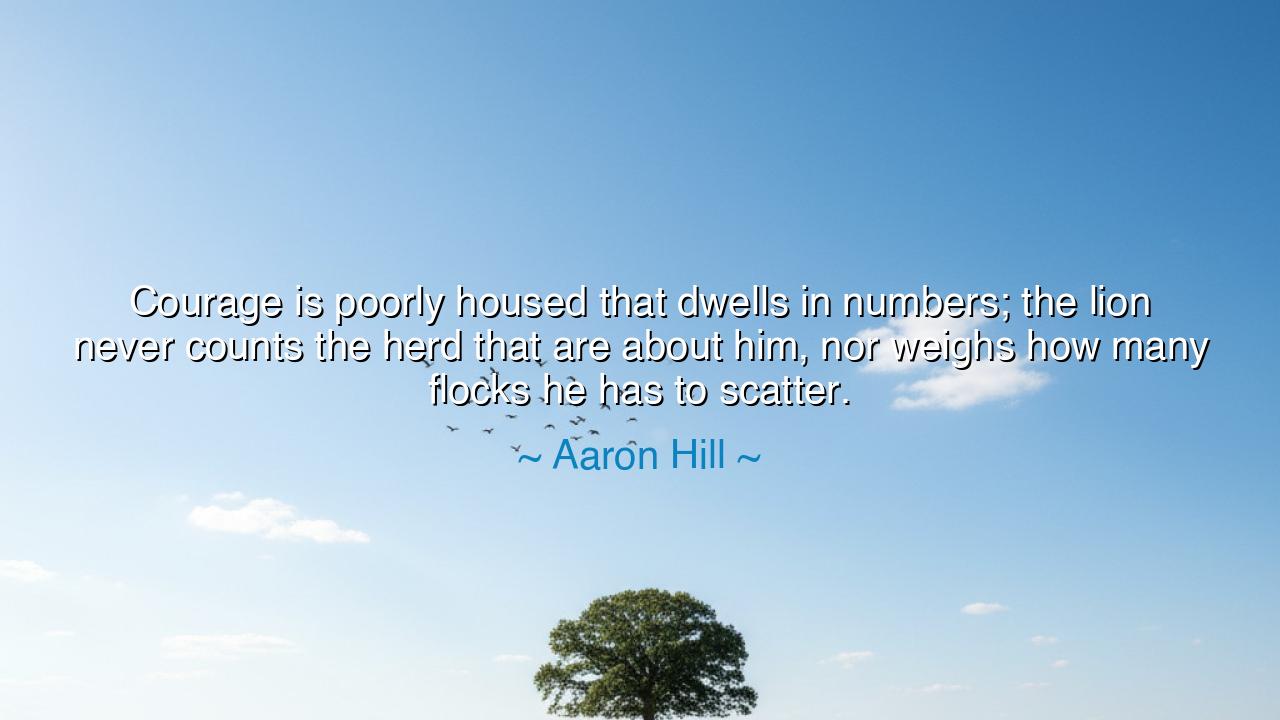
Courage is poorly housed that dwells in numbers; the lion never
Courage is poorly housed that dwells in numbers; the lion never counts the herd that are about him, nor weighs how many flocks he has to scatter.






“Courage is poorly housed that dwells in numbers; the lion never counts the herd that are about him, nor weighs how many flocks he has to scatter.” — Thus declared Aaron Hill, poet and philosopher of the eighteenth century, in words that burn like the mark of truth upon the heart. His saying calls us to remember what true courage is — that sacred flame which burns brightest not in the comfort of the crowd, but in the solitude of conviction. The courage that depends upon numbers is weakly born; it lives in the shadow of approval and dies the moment company departs. But the courage that stands alone, as the lion stands amid the plain, untroubled by the multitude, is the courage of kings, prophets, and souls who shape the world.
Hill’s meaning strikes at the heart of a timeless human failing: our dependence upon others for strength. Many call themselves brave when they are surrounded by allies — when the banner is raised and the multitude shouts their name. But when the crowd disperses and silence falls, how few remain steadfast! True valor is not measured by the number of voices that echo one’s cause, but by the steadiness of the spirit when all voices fall silent. To act rightly when no one cheers — that is the essence of courage. The lion does not look behind to count who follows him; his strength is his certainty, his faith in his own power.
This teaching is as old as civilization. In every age, the multitude has sought safety in numbers, mistaking it for courage. Yet all great deeds — the deeds that carve history — were born from solitude. Socrates stood alone before the court of Athens, condemned for speaking truth to comfort. He did not seek followers, nor count them; his courage was not housed in numbers, but in the fortress of his soul. The mob may have silenced his voice, but his spirit became immortal, inspiring countless generations to seek truth without fear. Thus, the one who dares to stand apart becomes the seed from which the courage of nations grows.
The lion, the symbol invoked by Hill, embodies this truth in nature’s own language. Surrounded by the herd, he does not measure the odds or calculate the danger. His confidence flows from his nature — from knowing what he is. Likewise, the truly courageous soul does not seek reassurance; he acts from the integrity of being. He may be outnumbered, outshouted, or misunderstood, but he moves as the lion moves — not rashly, but with calm authority. The weak man finds courage in companionship; the strong man finds it in conviction. This is the distinction that divides the brave from the merely bold.
In the origin of Hill’s words, we find his reflection on the nature of human bravery and leadership. Living in an age of social hierarchies and political cowardice, Hill saw how easily men confused popularity with power. He wrote against this illusion, reminding his generation that moral strength must not depend on public favor. The greatest figures in history — saints, revolutionaries, visionaries — have all stood alone before they were joined by others. Even the divine messengers, from Moses to Christ, walked through deserts of solitude before their words took root. Courage poorly housed in numbers is like a fire dependent on borrowed air; the first gust of opposition extinguishes it.
Think of Joan of Arc, that unarmed girl who faced the might of kingdoms. She did not wait for armies to rise behind her; she heard the voice of conviction and obeyed. Mocked, betrayed, and condemned, she never faltered. Surrounded by her enemies, she was not afraid, for her courage was not in the multitude but in her mission. Like the lion, she did not count the flocks; she faced them. And though she perished in flames, her spirit became a blaze that outshone her conquerors. This is the courage that Hill calls us to — the courage of one heart strong enough to face the world.
The lesson is clear, my child of the ages: do not wait for the crowd before you act, nor measure your strength by the approval of others. Seek not the courage that is borrowed from company, for it will fail you in the hour of testing. Cultivate instead the courage of solitude — the quiet resolve to stand for what is right, even when all stand against you. Be as the lion in the field: count not your foes, nor your friends, but trust the fire within.
For in the end, it is not the multitude that changes the world, but the one who dares to move first. Courage that dwells in numbers is fragile, but the courage that dwells in the soul is unbreakable. So let your heart be your fortress, your conscience your army, and your purpose your king. Walk alone if you must — for the lion who walks alone still rules the plain, and the multitude that trembles together still serves.






AAdministratorAdministrator
Welcome, honored guests. Please leave a comment, we will respond soon